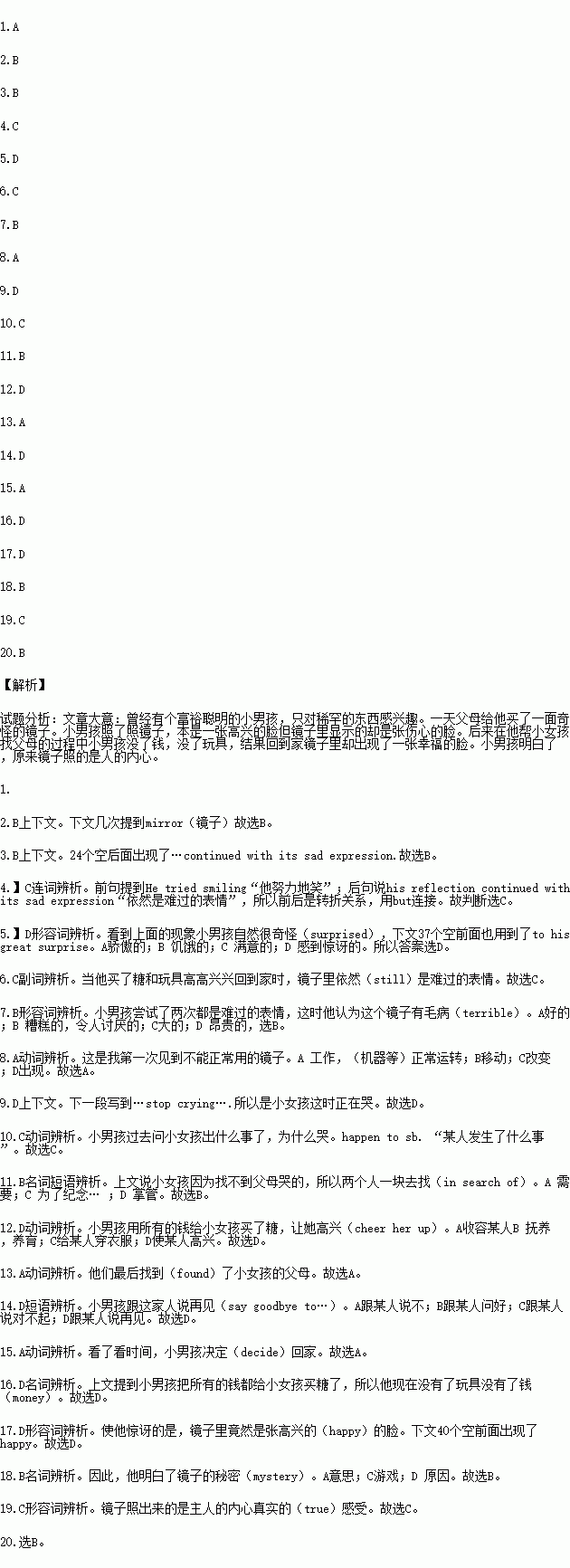题目内容
阅读下面短文,从短文后各题所给的四个选项(A、B、C和D)中,选出最佳选项。
There was once a boy who was very rich and clever but nothing could make him feel happy. He had almost everything a boy could ever want, so he was only ________ in the most rare objects. One day his parents bought him a very strange ________ . When the boy went to see his reflection (映像) in it, he looked very ________. He tried smiling, ________ his reflection continued with its sad expression.
________ , the boy went off to buy sweets and lots of toys. He came home as happy as he could be, but he ________ looked sad in that mirror.
“What a(n) ________ mirror! It’s the first time I’ve seen a mirror that didn’t ________ properly!”
That afternoon he went out to buy some toys and on his way he saw a little girl who was ________. The boy went over to see what had________ to her. The little girl said that she couldn’t find her parents.
Together the two children set off ________them. As the little girl wouldn’t stop crying, the boy spent all of his money buying her sweets to________her up. After much walking, they ________ her parents who were looking for her, very worried.
Then the boy said ________ to the family. When seeing the time, he ________ to head for home, without toys and without ________ In his room, to his great surprise, he found a(n) ________ face in the mirror. And so he understood the ________ of that mirror. The mirror could only reflect the________ feelings of its owner. He felt really happy at having ________ that little girl.
1.A. interested B. confident C. skilled D. rich
2.A. book B. mirror C. sweet D. toy
3.A. shy B. sad C. excited D. beautiful
4.A. for B. or C. but D. and
5.A. Proud B. Hungry C. Satisfied D. Surprised
6.A. already B. once C. still D. never
7.A. nice B. terrible C. big D. expensive
8.A. work B. move C. change D. appear
9.A. studying B. playing C. sleeping D. crying
10.A. devoted B. referred C. happened D. turned
11.A. in need of B. in search of C. in honor of D. in charge of
12.A. put B. bring C. dress D. cheer
13.A. found B. recognized C. left D. accepted
14.A. no B. hello C. sorry D. goodbye
15.A. decided B. agreed C. Pretended D. refused
16.A. effort B. hope C. doubt D. money
17.A. red B. dark C. angry D. happy
18.A. meaning B. mystery C. game D. reason
19.A. general B. strange C. true D. good
20.A. introduced B. helped C. invited D. saved


